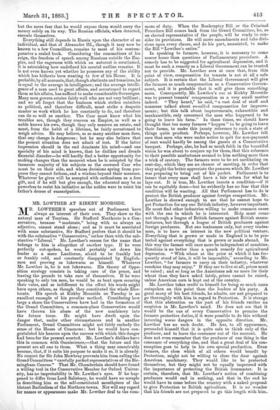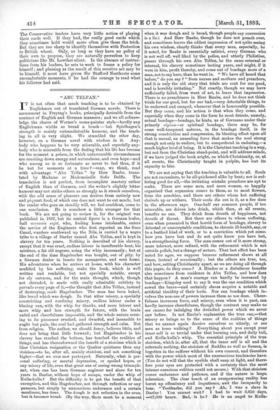MR. LOWTHER AT KIRKBY MOORSIDE.
MR. LOWTHER'S speeches out of Parliament have always an interest of their own. They show us the natural man of Toryism. Sir Stafford Northcote is a Con- servative, because "moderate," being with us always an adjective, cannot stand alone ; and as it must be associated with some substantive, Sir Stafford prefers that it should be with the substantive "Conservative," rather than with the sub- stantive "Liberal." Mr. Lowther's reason for the name that belongs to him is altogether of another type. If he were perfectly out-spoken, he would probably set down his leader as a mere Laodicean, afiaid to be frankly hot or frankly cold, and constantly disappointed by English- men not proving as lukewarm as himself. Whatever Mr. Lowther is, he is not lukewarm. His theory of Oppo- sition strategy consists in taking care of the pence, and leaving the pounds to take care of themselves. If he were speaking to only ten men, he would be as bent upon securing their votes, and as indifferent to the effect his words might have upon others, as though they constituted the whole Elec- torate. His speech at Kirkby Moorside on Tuesday is an excellent example of his peculiar method. Considering how large a share the Conservatives have had in the formation of the Grand Committees, a common-place Conservative would have thrown his abuse of the new machinery into the future tense. He might have dwelt upon the danger that, under other circumstances and in another Parliament, Grand Committees might not fairly embody the sense of the House of Commons ; but he would have con- gratulated his hearers upon the success with which this danger had been for the present averted. Mr. Lowther's dislikes have this in common with Omniscience,—that the future and the present are all one to them. What a thing may conceivably become, that., if it suits his purpose to make it so, it is already. No respect for Sir John Mowbray prevents him from calling the Grand Committees "carefully packed representatives of the Bir- mingham Caucus." That Mr. Chamberlain should have found a willing tool in the Conservative Member for Oxford Univer- sity, has no improbability in Mr. Lowther's eyes. If he hap- pened to differ from Lord Salisbury, he would have no scruple in describing him as the self-constituted mouthpiece of the blatant Radicalism of the Northern towns. Nor will any regard for names or appearances make Mr. Lowther deaf to the sum- mons of duty. When the Bankruptcy Bill or the Criminal Procedure Bill comes back from the Grand Committee, he, as an elected representative of the people, will be ready to con- sider its provisions. He will move amendments and take divi- sions upon every clause, and do his part, unassisted, to make the Bill "Lowther's entire."
In speaking to farmers, however, it is necessary to come nearer home than questions of Parliamentary procedure. A remedy has to be suggested for agricultural depression, and it must be such a remedy as a Liberal Government can be trusted. not to provide. Mr. Lowther sees at once that, from this point of view, compensation for tenants is not at all a safe subject. It is certain that the Liberal Government will give the farmers as much compensation as a Conservative Govern- ment, and it is probable that it will give them something more. Consequently, Mr. Lowther's cue at Kirkby Moorside was to present tenants' compensation as a very small matter indeed. "They heard," he said, "a vast deal of stuff and nonsense talked about so-called compensation for improve- meats; but this talk about improvements, exhaustible and inexhaustible, only concerned the man who happened to be going to leave his farm." In these times, we should have thought that too many farmers " happen " to be going to leave their farms, to make this jaunty reference to such a state of things quite prudent. Perhaps, however, Mr. Lowther felt sure that men who were under notice to quit for non-payment. of rent would hardly be among the guests at a Conservative banquet. Perhaps, also, he had so much faith in the beautiful vision he was about to conjure up for them, that this reference to their possible misfortunes seemed to him nothing more than. a trick of oratory. The farmers were to be Set meditating on rent-day, which they see no chance of meeting, in order that they might the better appreciate the panacea which Mr. Lowther was preparing to bring out of his pocket. Parliament is to insure that every man shall have a fair return for what he lays out. It is true, Mr. Lowther inserts a condition—if it can be equitably done—but he evidently has no fear that this condition will be wanting. All that Parliament has to do ir protect the British producer against foreign competition. Mr. Lowther is shrewd enough to see that he cannot hope to get Protection for any one British industry, however important. He must find other industries willing to make common cause with the one in which he is interested. Help must come. not through a league of British farmers against British manu- facturers, but through a league of British producers against foreign producers. Not one tradesman only, but every trades- man, is to have an interest in the new political venture. Everything that is grown or made in England is to be pro- tected against everything that is grown or made abroad. la this way the farmer will once more be independent of sunshine.. Sunshine is no better than a quack remedy for agricultural depression. "With wheat at the price at which it has fre- quently stood of late, it will be impossible," according to Mr. Lowther, "for farmers to carry on their industry, whatever sunshine they may enjoy." If they are to live at all, prices must be raised ; and so long as the Americans ask no more for their wheat than they have asked lately, prices cannot be raised, unless American corn is kept out of the country.
Mr. Lowther takes credit to himself for being so much more- outspoken on this point than the leaders of his party. A great many of his best friends, he admits, are not prepared to go thoroughly with him in regard to Protection. It is strange, that this abstention on the part of his friends excites no suspicion in Mr. Lowther's mind. He does not see that it would be the cue of every Conservative to promise the farmers protective duties, if it were possible to do this without incurring worse dangers in the opposite direction. Mr.. Lowther has no such doubt. He has, to all appearance, persuaded himself that it is quite safe to think only of the producer, and to leave the consumer out of the account. He- does not even remember that the producer of one thing is the consumer of everything else, and that a great deal of his con- sumption goes to help in his own special production. Even farmers, the class which of all others would benefit by- Protection, might not be willing to close the door against American machinery. They would like to be protected themselves, but they might not be equally impressed with the importance of protecting the British ironmaster. It is certain, therefore, that Mr. Lowther's notion of combining producers would end in nothing, and that in the end he would have to come before the country with a naked proposal to give Protection to British agriculture. It is no wonder that his friends are not prepared to go this length with him..
The Conservative leaders have very little notion of playing their cards well. If they had, the really good cards which they sometimes hold would more often give them the trick. But they are too sharp to identify themselves with Protection to British wheat. Only, so long as they have no policy of their own to propose, they are naturally powerless to keep politicians like Mr. Lowther silent. In the absence of instruc- tions from his leaders, he sets to work to frame a policy for himself ; and pleasing as the result of this creative act may be to himself, it must have given Sir Stafford Northcote some uncomfortable moments, if he had the courage to read what his follower had said.



































 Previous page
Previous page